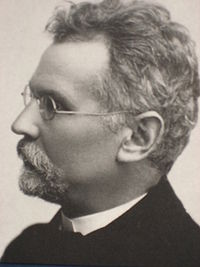Bolesław Prus Writer
Bolesław Prus, born Aleksander Głowacki, is one of the leading figures in the history of Polish literature and a distinctive voice in world literature. As a 15-year-old, he had joined the Polish 1863 Uprising against Imperial Russia; shortly after his sixteenth birthday, in a battle against Russian forces, he suffered severe injuries. Five months later, he was imprisoned for his part in the Uprising. These early experiences may have precipitated the panic disorder and agoraphobia that would dog him through life, and shaped his opposition to attempts to regain Polish independence by force of arms. In 1872 at age 25, in Warsaw, he settled into a 40-year journalistic career that highlighted science, technology, education, and economic and cultural development. These societal enterprises were essential to the endurance of a people that had in the 18th century been partitioned out of political existence by Russia, Prussia and Austria. Głowacki took his pen name Prus from the appellation of his family's coat-of-arms. As a sideline he wrote short stories. Achieving success with these, he went on to employ a larger canvas. Over the decade between 1884 and 1895, he completed four major novels: The Outpost, The Doll, The New Woman and Pharaoh. The Doll depicts the romantic infatuation of a man of action who is frustrated by his country's backwardness. Pharaoh, Prus' only historical novel, is a study of political power and of the fates of nations, set in ancient Egypt at the fall of the 20th Dynasty and New Kingdom.
Search
Writer
| Career start | 1872 |
|---|---|
| Career end | 1912 |
| genre | |
| movement |
Bolesław Prus on Wikipedia
External resources
- http://culture.pl/en/artist/boleslaw-prus-aleksander-glowacki
- http://encarta.msn.com/encyclopedia_762509811/Boleslaw_Prus.html
- http://univ.gda.pl/~literat/autors/prus.htm
- http://www.britannica.com/eb/article-9061664/Boleslaw-Prus
- http://www.encyclopedia.com/doc/1E1-Prus-Bol.html
- http://www.imdb.com/title/tt0060401
- http://www.imdb.com/title/tt0064570
- http://www.newpoland.com/famous_poles_prus.htm
- http://www.webcitation.org/5kwQCWwHc
